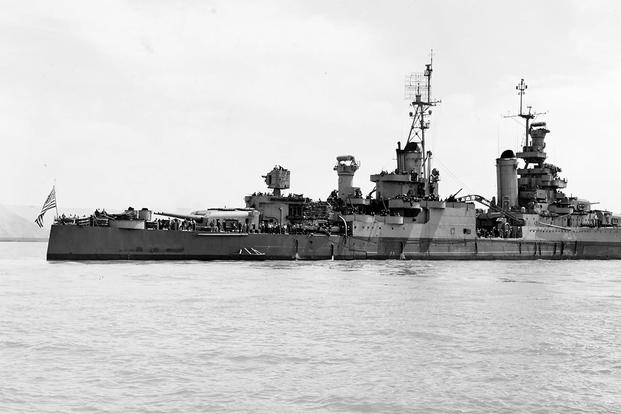On July 26, 1945, the USS Indianapolis reached the tropical island of Tinian after traveling 2,000 miles in less than 75 hours at an average speed of 29.5 knots. The ship's captain, Charles McVay III, knew what his men did not: that the ship was delivering key components for the atomic bomb that would be used to destroy the Japanese city of Hiroshima. After the offload was completed, McVay turned his ship towards the Philippines for a voyage that faced, he was assured by his superiors, no enemy threat.
This reassurance -- along with poor visibility and the failure of his superiors to notify McVay that the destroyer Underhill had just been torpedoed on the same route -- contributed to McVay's decision on the night of July 30, 1945, to stop the zigzag course mandatory in hostile waters. (When not in hostile waters, the zigzag course is at the captain's discretion.) On its straight course en route to a training mission, the Indianapolis was struck by torpedoes from the Japanese submarine I-58. It sank in 12 minutes.
Only 317 men out of the crew of 1,196 survived the five-day wait for rescue. McVay survived, only to become the only captain in the Navy's history to be court-martialed for losing his ship. He repeatedly asked the Navy why it took five days to rescue his men, and he never received an answer. The Navy has long claimed that SOS messages were never received because the ship was operating under a policy of radio silence; declassified records now show the Navy lied.
After years of grief-stricken letters from families of his crew, McVay -- haunted by the tragedy and exhausted from family troubles -- shot himself in the chin on his front lawn on Nov. 6, 1968.
The son of an admiral and a career officer with a fine record, McVay was court-martialed before the Navy inspector general had even completed his investigation. Many people, from son Charles McVay IV to author Dan Kurzman, who chronicled the Indianapolis tragedy in "Fatal Voyage," to members of Congress have long believed McVay was unfairly convicted. But it took Hunter Scott, now 15, of Pensacola, Fla., to shake Congress into writing a resolution to exonerate McVay and award a Presidential Unit Citation to the Indianapolis crew, of whom 134 members are still living. Scott began a history project on the ship when he was 11 and has worked doggedly with the survivors to try to right the injustice done to McVay.













